How to Play Threes Away
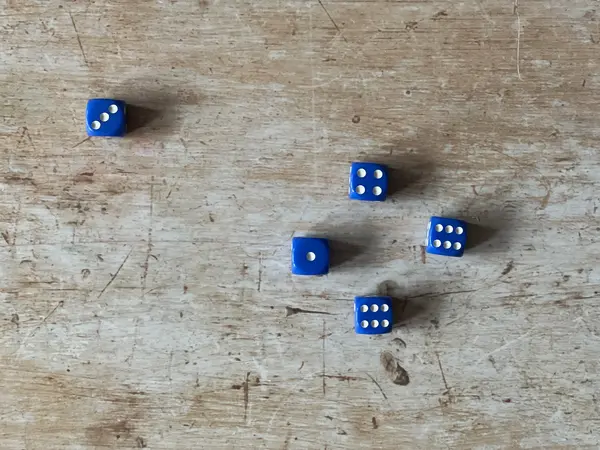
We love a good dice game! If you travel with some dice in your pocket, you'll never be bored, there's so much you can do with them. Today's game Threes Away requires five dice. While there is some luck involved, you'll also need to think strategically, and it encourages number recognition too.
You Will Need
Threes Away is easy to learn. It's a game for two or more players. As mentioned above, you will require five regular dice, plus some paper and pen to keep score, or you can download our scorecard if you wish.
Aim of the Game
The aim of the game is to be the player with the lowest score at the end. You can play for just one round, decide on a certain number of rounds to play (our score card allows for six rounds), or set a time limit, e.g. 15 minutes or half an hour.
How to Play
3s are worth zero points. All the other numbers are face value, e.g. a 4 scores four points.
On their turn, a player rolls all five dice. They must keep at least one dice, but can keep more than one if they wish. Any 3s must be kept. The dice being kept are set aside, and the remaining dice re-rolled, with the player again keeping at least one dice per roll until none are left to re-roll.
Question to think about: What's the minimum number a rolls a player can take? What's the maximum number of rolls?
After their last roll, the player adds up the value of all their kept dice, and records the score - remember, 3s are worth zero points! Play then passes to the next player. The round ends when all players have had a turn.
If you are playing more than one round, then on subsequent rounds the next player gets to start, so that everyone has the chance to go first.
Question to think about: What could be the advantages or disadvantages of going first?
Example
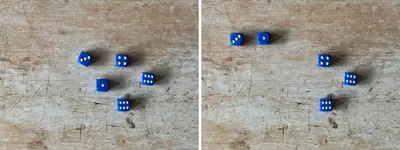
In this example, the player has rolled 1 - 3 - 4 - 6 - 6 on their first roll. They must keep the 3, but they also decide to keep the 1 as it's a very low score.
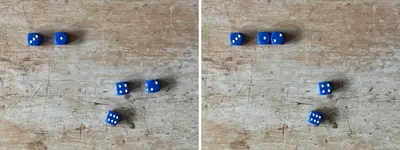
The player re-rolls their remaining three dice, and gets 2 - 4 - 6. Since the aim is to get the lowest score, they decide to just keep the 2.
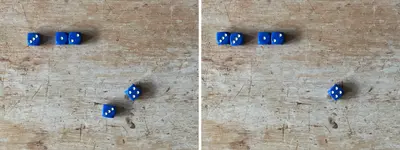
On their next re-roll, the player rolls 3 - 4. They must keep the 3. They decide to try their luck and re-roll the 4 to see if they can get a lower score than 4.
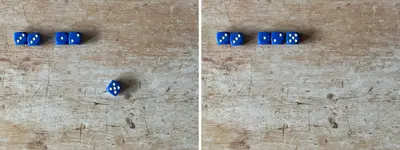
Alas, on their re-roll they get a 5, which is higher, but as this is their only die left, they need to keep the 5.
It's now time to add up the final score:
The two threes equal 0 points.
1 + 2 + 5 equals 8 points, so their score for this round is 8 points.
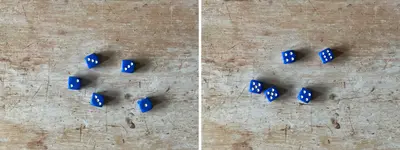
Here are two more examples of a player starting their turn.
In the first example, the player rolls 1 - 2 - 3 - 3 - 3. They must keep all three 3s, but decide to keep the remaining dice as they both have a very low face value. They end their turn after just one roll, with their final score being 3 (i.e. 1 + 2).
In the second example, the player rolls 4 - 4 - 5 - 5 - 6. There are no 3s, so the player must keep one of the other dice. They are all high value, so they decide to just keep one of the 4s as that is the lowest they can get on this roll.
End of the Game
A round ends when each player has had a turn to roll the dice. The game ends, after the agreed number of rounds or agreed time limit. The player with the lowest total score is the winner.
Strategic Thinking
While there is a little luck involved in the rolling of the dice, players also need to think strategically:
What are the risks and benefits of keeping dice that aren't 3s? As in one of the examples above, should you re-roll a 4 to try and get a lower score (a 1 or 2, or a 3 worth zero), at the risk of maybe ending up with a 5 or 6 instead.
Even a 2 can pose a conundrum - if scores between players are tight, then you might want to risk re-rolling a 2 to get a 1 or 3 (zero).
The order of play can also influence strategy. A player taking their turn later in the round, already knows the scores of the players that went before them, and can make their strategic decisions based on this knowledge. Whilst a player going first does not have that advantage when deciding what risks to take.
Variations
It's always fun to mix things up with some variations. What variations can you come up with? Here's some suggestions to get you started:
- Instead of the lowest score, aim for who gets the highest score. 3s are still worth zero points and must be kept, but this time they hinder instead of help you.
- Vary the number of dice you play with. Instead of 5 dice, you could for example use 3 or 7.
- Limit the number of times you can roll to two or three. Players must still keep any 3s, and on their last roll they must keep all remaining dice.
- If a player rolls five 3s and gets a score of zero, they immediately win the game.
How would these variations change the game? How would you need to rethink your strategy?
Maths skills involved: strategic thinking, number recognition, basic addition skills
Latest News and Events

STEM Ambassadors in Scotland Week 2026
STEM Ambassador in Scotland (SAIS) Week is a celebration of all things STEM in Scotland through the experiences of our STEM Ambassadors.

Active Maths Challenge
Start the year with our mini Active Maths challenge and measure what progress you can make over four weeks.
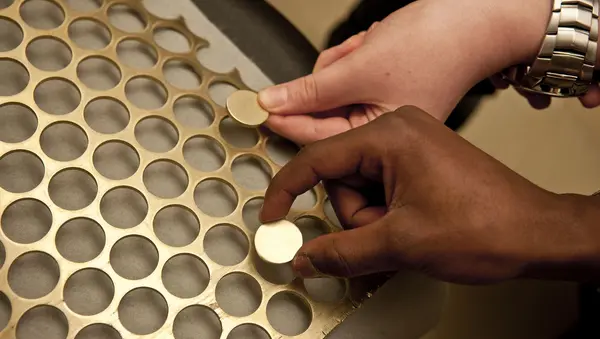
Money Maths at Museum on the Mound
We are excited to offer Maths versions of our popular money-themed schools workshops. These are entirely free of charge. Best suited for P5-P7 pupils.